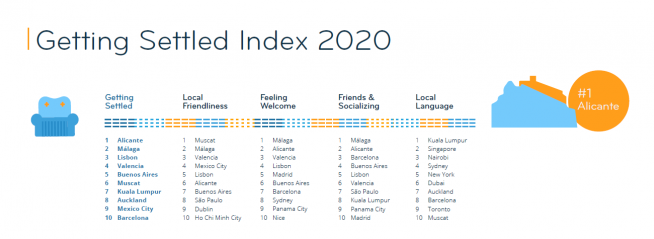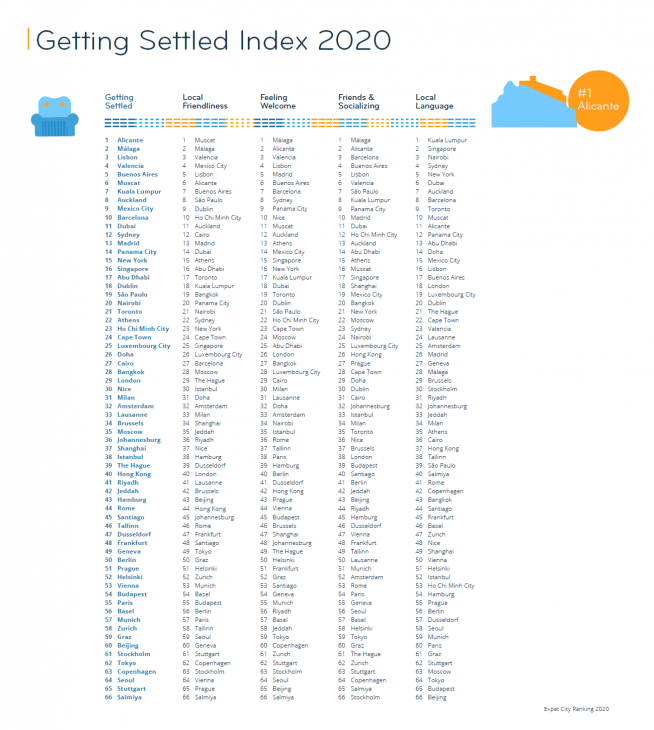From Friends to Language: Where It Is (Not) Easy to Settle In
- Alicante ranks first in the Getting Settled Index, with expats reporting happy social lives.
- Close to nine in ten respondents (87%) feel at home in runner-up Málaga (2nd).
- In Lisbon (3rd), 42% agree completely that people are friendly towards foreign residents.
- Cities in Spanish-speaking countries generally perform well in this index, making up six of the top 10.
- At the other end of the ranking, cities in East Asia, Northern Europe, and German-speaking countries land in the bottom 10.
The Top 10
Methodology
The Getting Settled Index includes four subcategories — Local Friendliness, Feeling Welcome, Friends & Socializing, and Local Language. Each subcategory is calculated based on two factors which were rated on a scale of one to seven: general friendliness of the population and friendly attitude towards foreign residents; feeling at home in the city and getting used to the local culture; finding new friends and satisfaction with social life; ease of living in the city without local language skills and of actually learning the language. For a city to be featured in the Expat City Ranking, a minimum sample size of 50 respondents is required. In 2020, 66 cities have met this requirement.
Friendly Folk in Alicante
Respondents in Alicante, the winner of the Getting Settled Index, are particularly happy with the factors in the Friends & Socializing subcategory, which results in a respective second place for the Spanish city. In fact, over two-thirds of the expats in Alicante (68%) agree that it is easy to find new friends (vs. 47% globally), and an even higher share of 77% are happy with their social life in Alicante (vs. 59% globally).
Respondents in Alicante are just as likely to agree that it is easy to get used to the local culture (77% positive ratings vs. 61% globally). Together with excellent results for feeling at home in this city — 83% agree that this is the case for them — this allows Alicante to also rank second in the Feeling Welcome subcategory, only beaten by Málaga.
I love the easy way of life and the friendliness of the people around me.
A British respondent in Alicante makes sure to highlight the “easy way of life and the friendliness of the people around me”. And others agree: 86% rate the general friendliness of local residents positively (vs. 68% globally), and a similar share (85%) considers the people of Alicante friendly towards foreign residents (vs. 66% worldwide). Close to half (49%) even agree completely with the latter (vs. 25% globally).
Together with few language difficulties — three in five expats in Alicante (60% each) agree that the local language is easy to learn and that it easy to live there even without local language skills — these results catapult Alicante to first place in the Getting Settled Index 2020. Good news for the 55% of respondents who are planning to possibly stay there forever (vs. 33% globally).
Feeling at Home in Málaga
Málaga’s results are rather similar to Alicante’s: respondents are very much satisfied with the local friendliness (2nd), feel welcome there (1st), and have little to complain about regarding friends and socializing (1st). In fact, close to nine in ten expats (87%) say they feel at home in Málaga (vs. 64% worldwide), and a similar share (88%) agrees that the people are generally friendly (vs. 68% globally). “I love the warmth of the people and the country,” a Swedish respondent shares.
I love the warmth of the people and the country.
Over three-quarters (77%) are happy with their social life in Málaga (vs. 59% globally), and 42% — double the global average (21%) — give this factor the best possible rating. More than three in five (62%) also agree that it is easy to find new friends there, 15 percentage points more than the global average of 47%.
What is keeping Málaga from the top is the local language: while 60% report no problems living there without local language skills, only 38% of the respondents agree that the language is easy to learn. Compared to 60% in Alicante, this result shows that the local Andalusian dialect in Málaga is more difficult than some might have thought.
Finding New Friends in Lisbon
Portugal’s capital does not only rank third in the Expat City Ranking but also comes in third place in the Getting Settled Index. Respondents feel at home in Lisbon — 82% rate this factor favorably (vs. 64% globally) — and four in five (80%) report that it is easy to get used to the Portuguese culture (vs. 61% globally).
The people are extremely friendly.
“The people are extremely friendly,” according to a US American respondent in Lisbon; 86% of expats agree and rate the general friendliness of the local population positively (vs. 68% globally). This friendliness may also be a reason for the ease of finding new friends in Lisbon: over seven in ten expats (71%) agree that this is not difficult (vs. 47% globally), and an even larger share (79%) is happy with their social life (vs. 59% globally).
Lisbon does not do quite as well in the Local Language subcategory but still comes in a good 16th place. “There are poor job opportunities for expats who don't speak Portuguese,” according to a Russian respondent. However, nearly four in five expats in Lisbon (78%) find it is easy to live there without speaking the local language (vs. 54% globally).
Spanish-Speaking Cities Predominate
Alicante and Málaga are not the only Spanish cities where expats find it easy to settle down. In fact, with Valencia (4th) and Barcelona (10th), four of the top 10 cities in the Getting Settled Index are located in Spain — while the Spanish capital, Madrid (13th), is not far behind. Expats in all five destinations feel at home there and find it easy to get used to the local culture — Barcelona receives the “worst” result here with a seventh place in the respective subcategory.
Respondents in these Spanish cities are just as satisfied with their social life and how easy it is to find new friends, with all five ranking in the top 10 for these factors. Opinions regarding the local friendliness and language are not quite as uniform, but all five cities still land in the upper half of the ranking.
Buenos Aires (5th in the Getting Settled Index) and Mexico City (9th) in the Spanish-speaking destinations Argentina and Mexico see excellent results, too, with respondents particularly praising the friendliness of the population and how easy it is to get used to the local culture in these cities. Muscat (6th), Kuala Lumpur (7th), and Auckland (8th) complete the top 10, receiving their best results in the Local Friendliness (Muscat ranks 1st) and Local Language (Kuala Lumpur 1st, Auckland 7th) subcategories.
But Getting Settled Isn’t Always Easy
Salmiya does not only rank last in the Expat City Ranking in general, but it is also the worst-rated city in the Getting Settled Index (66th out of 66). Indeed, the Kuwaiti city places last or second to last in three out of four subcategories in this index, with only the Local Language subcategory getting a better — but still below-average — result (40th). The majority of respondents doesn’t feel at home in Salmiya (54% vs. 21% globally), finds it hard to make new friends (59% vs. 33% globally), and disagrees that it is easy to get used to the local culture (52% vs. 21% globally).
It is not easy to integrate in Stuttgart.
The verdict on Stuttgart (65th) in southwestern Germany is not quite as harsh, though results are still noticeably below average: 47% say it is difficult to make new friends there (vs. 33% globally), and around two in five are dissatisfied with their social life (43% negative ratings vs. 24% globally), as well as with the general friendliness of the local population (41% vs. 17% globally). “The locals are stand-offish in general,” says a Greek respondent. “It is not easy to integrate.” German poses an additional problem: 58% of respondents think it is not easy to live in Stuttgart without speaking the local language (vs. 30% worldwide).
Seoul (64th), on the other hand, receives its worst results in the Feeling Welcome subcategory, where it also ranks 64th. Fewer than half the respondents (48%) say they feel at home in the South Korean capital (vs. 64% globally), and 41%, nearly twice the worldwide average, think it is difficult to get used to the local culture (vs. 21% globally). In part, this might be connected to the local (lack of) friendliness: only 39% think that people in Seoul are friendly towards foreign residents (vs. 66% globally)! What’s more, close to two in five (39%) say it is a struggle to live in the city without local language skills (vs. 30% globally), and 64% consider Korean difficult to learn (vs. 46% globally).
Trends in the Bottom 10
A look at the bottom 10 shows that cities in East Asia, Northern European countries, and German-speaking destinations predominate. Like in Seoul (64th), expats in Tokyo (62nd) and Beijing (60th) struggle in particular with the local language and culture.
The culture of reservation, silence, and conformity in Stockholm can be a shock to many.
Stuttgart (65th), on the other hand, is joined by Copenhagen (63rd), Stockholm (61st), Graz (59th), Zurich (58th), and Munich (57th) in the bottom 10, with negative ratings across most rating factors in this index. In the words of a Guatemalan respondent in Stockholm: “The culture of reservation, silence, and conformity can be a shock to many.” Compared to the success of Spanish and Portuguese cities in the index, this shows an interesting north-south divide in Europe when it comes to the ease of settling in.
Local Friendliness around the World
While Muscat places sixth in the Getting Settled Index, it is the undisputed winner in the Local Friendliness subcategory. Over four in five expats (82%) consider the residents in the Omani capital generally friendly, 14 percentage points above the worldwide average (68%). An even higher share (89%) describes the attitude towards foreign residents as friendly — half (50%) even as very much so (vs. 66% and 25% globally).
Málaga (2nd), which has already been covered in detail above, joins Muscat on the podium for this subcategory, as does Valencia (3rd). In fact, not one respondent in Valencia has anything negative to say about the population’s friendliness, and 86% agree that the local people are friendly towards expats in particular, 20 percentage points above the global average (66%).
Salmiya (66th), Prague (65th), and Vienna (64th), on the other hand, do not perform well at all in this subcategory. Fewer than a quarter (24%) rate the general friendliness in Salmiya positively, compared to a global average of 68%. And in both Prague and Vienna, 42% of respondents don’t think that the attitude towards foreign residents in their respective city is friendly (vs. 18% globally).
Feeling at Home Abroad
Alicante and Málaga place not only first and second in the Getting Settled Index, but also second and first, respectively, in the Feeling Welcome subcategory. They are joined in the top 3 by a third Spanish city, Valencia. At least four in five respondents feel at home in Valencia (80% vs. 64% globally) and agree that it is easy to get used to the local culture there (84% vs. 61% globally).
Just like in the overall index, Salmiya (66th) and Seoul (64th) are also found at the other end of the ranking scale in this subcategory, making up the bottom 3 together with Beijing (65th). Over two in five expats in the Chinese capital (41%) find it difficult to get used to the local culture (vs. 21% globally), and more than three in ten (31%) don’t feel at home there (vs. 21% globally).
New Life, New Friends?
In the Friends & Socializing subcategory, it is again three Spanish cities that land in the top 3: Barcelona (3rd) joins Málaga (1st) and Alicante (2nd) — which have been covered in detail above — on the podium. Over two in three respondents (68%) find it easy to make new friends in Barcelona (vs. 47% globally). What is more, 81% are happy with their social life, 22 percentage points above the worldwide average (59%).
Expats in Stockholm (66th) paint a very different picture: close to three-quarters (72%) think it is difficult to find new friends in the Swedish capital (vs. 33% globally), ranking Stockholm last for this factor. Over two in five (42%) are unhappy with their social life, too (vs. 24% globally).
For Salmiya’s results, which also places second to last in this subcategory, please refer to the earlier section on the index’s bottom 3. The third city at the end of the list is Copenhagen with a 64th rank in this subcategory. Like in Stockholm, respondents struggle to find new friends in the Danish capital (59% negative responses), and over a third (34%) are dissatisfied with their social life as well.
The Importance of Language
Kuala Lumpur (1st), Singapore (2nd), and Nairobi (3rd) lead the ranking in the Local Language subcategory, while Beijing (66th), Budapest (65th), and Tokyo (64th) land at the very bottom.
Over nine in ten expats in Kuala Lumpur (91%) agree it is easy to live there without speaking the local language, while 73% of respondents in Singapore and 81% in Nairobi say the same (vs. 54% globally). However, it is worth noting that the Expat Insider survey was conducted in English, which is widely spoken in all three cities and even has official status in Singapore and Kenya.
On the other hand, around two in five expats in Beijing (39%) and Tokyo (44%) say it is difficult to live in these cities without local language skills (vs. 30% globally). Respondents in Budapest report fewer difficulties in this regard (25% negative ratings). However, Hungarian seems to be incredibly hard to learn: 94% of expats in Budapest state it isn’t easy to learn the local language, more than twice the global average (46%). Not quite two-thirds (64%) even think it is very difficult (vs. 18% globally), ranking the Hungarian capital last for this factor.





